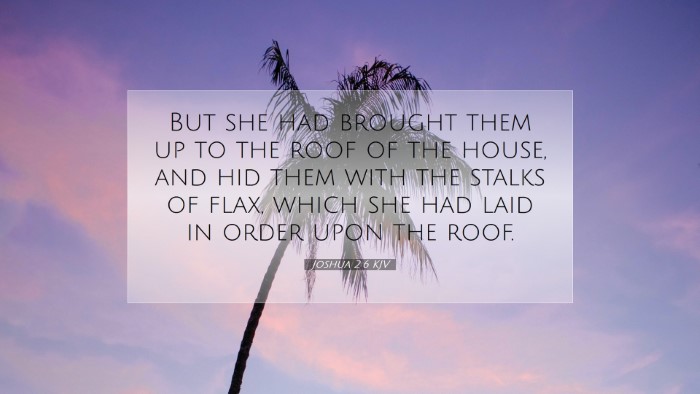Old Testament
Genesis Exodus Leviticus Numbers Deuteronomy Joshua Judges Ruth 1 Samuel 2 Samuel 1 Kings 2 Kings 1 Chronicles 2 Chronicles Ezra Nehemiah Esther Job Psalms Proverbs Ecclesiastes Song of Solomon Isaiah Jeremiah Lamentations Ezekiel Daniel Hosea Joel Amos Obadiah Jonah Micah Nahum Habakkuk Zephaniah Haggai Zechariah MalachiJoshua 2:6
Joshua 2:6 KJV
But she had brought them up to the roof of the house, and hid them with the stalks of flax, which she had laid in order upon the roof.
Joshua 2:6 Bible Commentary
Commentary on Joshua 2:6
Joshua 2:6 states, "But she had brought them up to the roof of the house, and hid them with the stalks of flax, which she had laid in order upon the roof." This verse serves as a pivotal point in the narrative surrounding Rahab and the Israelite spies. It offers insights into themes of faith, mercy, and God’s providential care, which have been extensively explored by theologians and biblical scholars.
Contextual Overview
The context of Joshua 2 is critical for understanding this verse. The Israelites, under the leadership of Joshua, are preparing to enter the Promised Land. The crossing of the Jordan and the conquest of Jericho are imminent, and reconnaissance is essential. Thus, Joshua sends spies to Jericho to gather intelligence on the city and its defenses.
This mission leads them to the house of Rahab, a harlot, who becomes an unexpected agent of God's plan. Her role emphasizes God's sovereignty and grace, as He chooses to use someone socially marginalized in society for His divine purpose. The text captures the contrast between the Israelite spies, representatives of God’s chosen people, and Rahab, a Gentile, further illustrating the inclusivity of God’s mercy.
Insights from Matthew Henry
Matthew Henry, in his commentary, emphasizes the craftiness of Rahab as she conceals the spies. He notes, "She was a woman of courage and of great faith, and her hiding the spies was an act of hospitality and faith in the God of Israel." Henry suggests that Rahab’s actions reflect her understanding of the imminent doom of Jericho and her desire to align herself with the God of Israel.
Henry also points out that her home, often symbolically associated with protection and safety, serves as a sanctuary for the spies. He elaborates on the spiritual significance of Rahab's actions, interpreting them as a prelude to God’s deliverance, not only for her but for her entire household. "She recognized the true God, thus defying the false gods of her people," he writes, underscoring the transformative power of faith.
Insights from Albert Barnes
Albert Barnes, in his analysis, focuses on the practical aspects of Rahab’s concealment of the spies. He asserts that "Hiding them on the roof, under stalks of flax, was both wise and skillful, showcasing her quick thinking in the face of danger." Barnes highlights Rahab's resourcefulness, emphasizing the importance of faith being coupled with action.
Barnes also draws attention to the symbolic act of hiding, suggesting it represents the believer’s call to shield not only themselves but also others from the wrath of God that comes upon the unrepentant. He quotes Rahab’s recognition of God’s sovereignty over the nations, suggesting her faith leads to her future salvation. "By faith, Rahab the harlot did not perish with those who did not believe," echoing Hebrews 11:31.
Insights from Adam Clarke
Adam Clarke provides an in-depth examination of the cultural implications of Rahab's actions. He explains that "In her act, there is both a refusal to remain loyal to the corrupt city of Jericho and an embrace of the covenant people of God." Clarke notes the historical significance of Jericho's impending doom and Rahab's recognition as a turning point in her life.
Clarke also provides a theological interpretation of Rahab’s faith, suggesting it is a model for future believers. He indicates that her actions were motivated by a deep understanding of God’s power and promise, and he emphasizes the attribute of faith in uncertain times. "Her faith was not blind; it was based on the knowledge of God's previous works," Clarke notes, highlighting the necessity of grounding one’s faith in God’s faithfulness.
Theological Implications
This verse encapsulates the broader theological implications surrounding faith, deception, and divine providence. Firstly, it demonstrates that God’s grace reaches beyond the confines of cultural and moral boundaries. Rahab, a Gentile and a harlot, epitomizes the notion that God’s salvation is available to all who believe, regardless of their past.
Secondly, the act of hiding the spies can be perceived as a form of righteous disobedience, challenging conventional morality. This raises discussions about the nature of morality in the face of divine command and the complexities of faith in action. Rahab’s lies to protect the spies might lead to moral inquiries about the ethics of deception in dire circumstances, thereby inviting readers to engage deeply with the nuances of faith.
Conclusion
Joshua 2:6 serves as an extraordinary testament to God's mercy, the power of faith, and the unexpected ways in which God can work through ordinary people. Rahab’s faith leads not only to her own salvation but also provides a critical link in the lineage of Christ, as noted in the New Testament. Her story invites pastors, students, theologians, and scholars to reflect upon the nature of faith, the inclusivity of God’s grace, and the call to act in faith-filled ways amidst uncertainty.
Thus, the commentary on this verse should inspire one to consider how faith manifests in everyday life, particularly in the face of social and moral quandaries. It serves as a reminder that God is at work, often in unexpected people, and that our actions can have eternal significance in the unfolding of His redemptive story.


